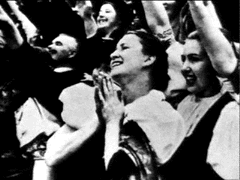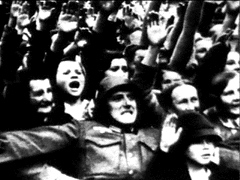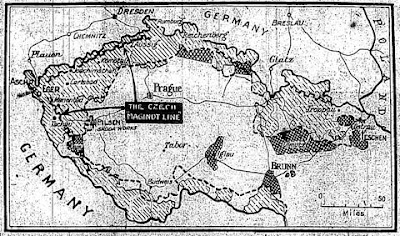Preceding the Munich conference, the Czechoslovakian people would say "Even if our allies fail us, no matter if we are left to face overwhelming odds and certain defeat, nevertheless Czechoslovakia will fight rather than yield!"
Newly installed Prime Minister General Jan Syrový said in a nationwide broadcast "As soldier and as Premier ... I am passing through the saddest moment of my life, for I am fulfilling a most painful duty, a duty which for me is worse than death. . . . We were confronted with a choice between desperate and hopeless defense, which would have meant the sacrifice of our whole younger generation, their children and their wives, and acceptance of the conditions imposed on us under pressure and without war, which in their mercilessness are unexampled in history. There are smaller states than ours that lead healthy existences. . . . We shall be within narrow frontiers, but we shall be all together in one family! . . . Our army will stand guard over the nation as before. . . . Trust us!"
The soldiers, as they withdrew, gave bystanders dark scowls and muttered oaths, the Czech officers avoided meeting civilian eyes, discharged their bitter duty with compressed lips. Nazi folk of the Sudeten town of Cesky Krumlov were the first Germans to dishonor themselves by opening dastardly fire upon the retreating Czech soldiers' backs. These Sudetens were also the first to smash windows and pillage shops and homes owned by Czechs, Jews and non-Nazi Sudetens such as Communists, Socialists and Social Democrats. Such outrages were not typical but exceptional, according to latest dispatches. The German army entered those parts of Czechoslovakia which it is to take over progressively by October 10 in the same peaceful fashion as it entered Austria, was cheered last week by civilians.
The German troops, ordered to swing across the frontier at three different points between Helfenberg and Finsterau at 2 PM. precisely, had set their legs in motion on German soil at 1:58 PM by the wrist watch of their commander, Colonel General Wilhelm Ritter von Leeb. They entered first that part of the Bohemian Forest in which Schiller laid his play The Robbers. Since in these rustic parts there were no accommodations deemed suitable for high officers, these, on the first night, left their German troops sleeping in tents or peasant huts, themselves returned to sleep in hotels in Germany, hurried back next morning into Sudetenland.
Fifty-eight hours after the German Army, Dictator Hitler entered Czechoslovakia under a drizzling rain this week. Every German car on this road which might possibly have contained the Führer had been wildly cheered by Sudetens for hours beforehand, and when Adolf Hitler finally reached Eger, "The Sudeten Capital," its throngs were both hoarse and hysterical. It was less than seven months since Austrians had similarly welcomed "our Deliverer," and the Führer seemed much moved as he made what was for him an exceptionally humble speech: "In this hour I want to thank the Almighty for having blessed us in the past, and to pray that He may also bless us in the future. . . . Germany is happy! . . . All are comrades ready to stake their lives for each other. . . . Over this greater German Reich is laid a German shield protecting it and a German sword defending it!"
"Vote for the Fatherland!" In Prague, although the sweeping catastrophe was obvious, editors took up the task of putting as bright an aspect on the situation as they could. The optimistic vigor of President Beneš remained dauntless. As the Chief Executive, he at once turned on every organ of propaganda and reassurance to persuade Czech refugees from areas in which plebiscites are to be held to return to the homes from which they fled under Nazi threats and "Vote for the Fatherland!"
Everywhere food was still plentiful in the land, much more so than in Germany, and there was no break in the amazing Czech morale, which endured nearly 400 years of oppression under Habsburg masters. With backhanded cheerfulness, the Narodni Listy reminded its readers: ''The history of the Czechs is almost an uninterrupted tragedy!"
 People throughout the United States were panicked the night of October 30th during a strange broadcast of the Mercury Theater on CBS Radio.
People throughout the United States were panicked the night of October 30th during a strange broadcast of the Mercury Theater on CBS Radio.
pano2.jpg)







